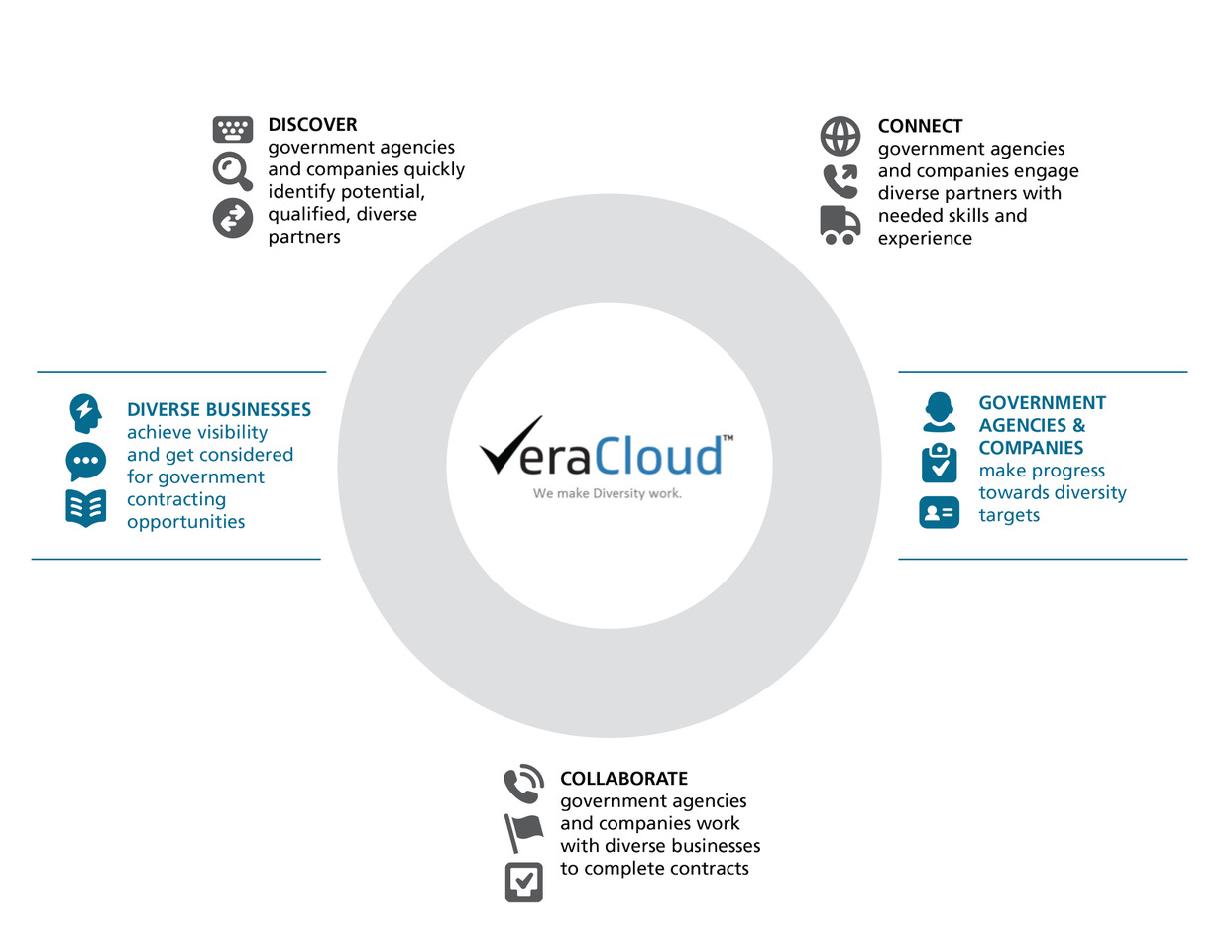
SUMMARY
Progressive government policies have been put in place over recent decades to address systemic discrimination in federal, state, and local public sector contracting markets nationwide. These policies have created measurable diversity targets for public sector contracting. Although designed to fight discrimination, and ensure that Minority, Women, Veteran, Disadvantaged and other diverse business enterprises (MWBEs, VBEs, and DBEs), can better compete for public sector contracts, these diversity targets are frequently not met. MWBEs, VBEs, DBEs, and other diverse businesses rarely get access to significant public sector contracting revenues. The results: Persistent inequality, discrimination, and billions of dollars in unrealized economic opportunity that could positively impact MWBEs, VBEs, DBEs, and other diverse businesses, and their communities.
VeraCloud, a Boston-based, for-profit, mission-driven social enterprise that’s part of the Commonwealth of Massachusetts IT Small Business Incubator Pilot,1 is working to change this in Boston, and in cities and states across the U.S. -- leveraging technology to fuel the implementation of progressive government policies that promote diversity, access, and inclusion. VeraCloud’s easy-to-use, cloud-based, matchmaking platform democratizes access to public sector contracting by giving MWBEs, VBEs, DBEs, and other diverse businesses free digital tools so they can better compete for their fair share of trillions of dollars in public-sector contracting opportunities. At the same time, VeraCloud partners with municipalities, government agencies and authorities, as well as large prime contractors (typically companies awarded public sector contracts who then subcontract work out to smaller diverse firms). VeraCloud provides these larger entities with tools so they more effectively and efficiently match qualified, certified, smaller diverse businesses with government procurement needs, and make real progress towards diversity targets.
How Public Sector Contracting Can Help Create Opportunity
Progressive government policies put in place over decades have created measurable diversity targets for public sector contracting. Hard battles have been fought at federal, state, and local levels to fight discrimination and ensure more equitable access to government-funded contracts: Presidents Kennedy, Johnson, Nixon, and Carter all signed executive orders to increase women and minority participation in U.S. government contracting.
Echoing these federal statutes, multiple states and municipalities have enacted similar mandates. As a result, when local, state, and federal agencies procure an estimated $5 trillion annually in products and services -- everything from IT upgrades, to school construction, to office supplies -- they must direct a percentage of spending (sometimes as high as 30 percent) towards qualified MWBEs, VBEs, DBEs, and other diverse businesses. The potential positive impacts of achieving diversity targets linked to this spending are remarkable. To do some simple math, if more than 30 percent diversity goals on approximately more than $5 trillion in total contracts were met, an incremental more than $500 billion a year could flow to diverse businesses and their communities.
Revenue at this scale could obviously have a transformative impact on issues of equity and economic opportunity. First, directing incremental revenues to MWBEs, VBEs, DBEs, and other diverse businesses could help address a wealth gap impacting communities of color that a 2015 Federal Reserve Bank of Boston study, The Color of Wealth in Boston, termed “staggering.” This study stated that in Boston, “Nonwhite households have only a fraction of the net worth attributed to white households. While white households have a median wealth of $247,500, Dominicans and U.S. blacks have a median wealth of close to zero.” 2 Yes, zero.
Another critical issue that achieving public sector contracting diversity targets could positively impact: A colossal entrepreneurship gap that disproportionately impacts people of color. The key takeaway from a recent report by the Kauffman Foundation, The State of Entrepreneurship 2017, is that entrepreneurship is pretty much a white male phenomenon. The report reveals that, although the U.S. is more racially diverse than ever, entrepreneurship does not match up: Entrepreneurs today are 80.2 percent white and 64.5 percent male, revealing significant opportunity gaps for women and people of color. This persistent under-representation of minority groups and women creates a multi-million dollar drag on the economy by reducing potential businesses and jobs. According to the Kauffman report, if minorities started and owned companies at the same rate as whites, the U.S. would have more than one million more businesses creating a potential more than 9.5 million jobs.3 Achieving public sector contracting diversity targets could help close this gap -- both by strengthening existing minority- and women-owned businesses through access to incremental revenues, and stimulating the formation of new minority- and women-owned businesses to service real public sector contracting needs.
Why Aren’t Diversity Targets Being Met?
So if public sector contracting is such a high-potential driver of equity and economic opportunity, why aren’t diversity targets being met? Despite decades of government leadership on policies that promote diversity, access, and inclusion for MWBEs, VBEs, DBEs, and other diverse businesses, widespread positive results have not followed in the marketplace. Legislation has been hobbled by entrenched discrimination, and the lack of tools to efficiently and effectively connect the public sector contracting marketplace. Many businesses, even though they have the right capabilities and experience to meet government contracting requirements, are isolated from economic opportunities, and lack access to networks, information, and affordable digital tools to pursue government contracts. Traditional approaches to engaging MWBEs, VBEs, DBEs, and other diverse businesses are inefficient, labor intensive, ineffective, and surprisingly pre-digital. Government agencies and large prime contractors/vendors that are awarded jobs and then subcontract work out to smaller firms rely on fragmented, outdated, low-ROI methods. Typically these are things like postcard mailings, advertising in publications that many diverse businesses don’t have time to read, and physical meet-and-greet job fairs that draw limited audiences, take time and resources to execute, and deliver limited success.
A case in point: New York City has one of the nation’s largest and most diverse populations and business community, with minority- and women-owned business enterprises comprising more than half of all firms in the City. Despite significant efforts over decades to increase procurement opportunities for women and communities of color (including legislation, programmatic investments, and multi-sector collaboration), the share of city procurement dollars received by diverse businesses is abysmally low, and has not changed in decades. In 2016, with only 4.8 percent of city procurement going to diverse businesses, the City of New York gave itself a grade of D+ on its diversity efforts.4
This pattern of well-intentioned attempts leading to failure is repeated across the country. In Boston, despite a similar combination of executive orders, programmatic support, and cross-sector collaboration to increase public sector contracting diversity, significant inequities still exist. In recognition of systemic issues, in late 2017, Boston is conducting a disparity study to “identify and address gaps, and ultimately strengthen the City's procurement practices across all departments.” This can’t happen soon enough. Ensuring that MWBEs, VBEs, DBEs, and other diverse businesses are certified is an essential best practice of achieving diversity targets, and on this count, Boston is sorely lacking: Out of an estimated 40,000 small businesses in Boston, less than two percent of all small, local, minority, women, veteran, and service disabled veteran owned business are certified by the city.5
Connecting a Disconnected Marketplace
The good news is that there is a solution hiding in plain sight -- an economic lever that can be pulled immediately to help close wealth and entrepreneurship gaps: The massive spending power of public-sector contracting. If diversity targets were fully realized against the multiple millions of dollars in public and private-sector contracting that flow through cities, states, and regions every day, this could create significant economic opportunities for diverse entrepreneurs, and help them, in turn, create jobs and increase wealth in their communities.
What’s needed to make this a reality? Accessible, easy-to-use, digital tools that enable diverse entrepreneurs to grow their businesses through helping government do its work. Diverse entrepreneurs need a reliable way to access and compete for public-sector opportunities, while government agencies and large prime contractors need a way to quickly and effectively outreach one hundred percent of all potential qualified diverse businesses to find qualified suppliers. VeraCloud’s matchmaking platform is designed to do just that. VeraCloud’s proprietary engine aggregates and optimizes multiple, often incomplete, inaccurate, outdated, and/or disconnected government databases, and incorporates dynamic user-inputted credentialing data to deliver unprecedented levels of data integrity -- enabling vastly improved operating practices and results.
VeraCloud efficiently connects both sides of the public sector contracting marketplace. On the one side, VeraCloud’s easy-to-use, cloud-based, matchmaking platform gives MWBEs, VBEs, DBEs, and other diverse businesses free access to digital communications, tracking, and business management tools so they can better compete for and deliver public sector contracting opportunities. Simultaneously, VeraCloud offers critical tools to the other side of the marketplace, enabling government agencies and large prime contractors to streamline, accelerate, and optimize their performance so they more effectively and efficiently match qualified, certified, diverse businesses with contracts. VeraCloud uses a “Robin Hood” model for its products and services: Access to all digital communications, tracking, and business management tools is free for MWBEs, VBEs, DBEs, and other diverse businesses, while government agencies and large prime contractors pay to use the VeraCloud platform and toolkit.

Activating the Public Sector Contracting Ecosystem in Boston and Beyond
One final point: Achieving success in reaching diversity targets requires a systems mindset and approach. That’s why VeraCloud seeks to engage the broadest possible set of stakeholders to activate the entire public sector contracting ecosystem within cities and states. This means working with a range of organizations including government, companies, nonprofits, foundations, private philanthropy, investors, and universities to support efforts to stimulate entrepreneurship, drive economic growth, and promote diversity, access, and inclusion. For example, many nonprofits, incubators, and government agencies support entrepreneurs and work to help diverse businesses get certified. Unfortunately, many of these efforts are siloed and do little to connect entrepreneurs to real business opportunities. It’s common for diverse businesses, after expending considerable time and resources to get certified as a MWBE, VBE, or DBE, to never have an opportunity to actually use their certifications. That’s where VeraCloud comes in -- creating a clear pathway for certified diverse businesses to access real revenues from public sector contracting opportunities.
Conclusion
Access to public sector contracting is a powerful, underutilized tool that can create real economic opportunity for MWBEs, VBEs, DBEs, and other diverse businesses and their communities. Progressive government policies put in place to provide these businesses a fair opportunity to compete for government-funded contracts have proven insufficient. What’s needed are easy-to-use, digital tools like VeraCloud’s matchmaking platform, built to level the playing field, and provide MWBEs, VBEs, DBEs, and other diverse businesses a clear pathway to real revenues from public sector contracting opportunities.
Works Cited
1. Introducing the Information Technology (IT) Small Business Incubator Pilot, MA Procurement Insights, The Official Blog of the Massachusetts Operational Services Division (2016). Link
2. Ana Patricia Muñoz, The Color of Wealth in Boston, Federal Reserve Bank of Boston (2015).
3. State of Entrepreneurship 2017: Three Mega Trends Shaping the Future of Entrepreneurship, Ewing Marion Kauffman Foundation (2017)
4. Scott M. Stringer, Making The Grade 2016: New York City Agency Report Card on Minority- and Women-Owned Business Enterprises, New York City Diversity Office, Bureau of Policy and Research, (2016).
5. City of Boston.gov, SLBE/MWBE /VOSBE Directory Search. Link, Accessed October 26, 2017.
Author Bio
Craig Bida
Craig Bida is the Chief Marketing Officer at VeraCloud Technologies, Inc., where he leads stakeholder engagement and marketing and communications strategy development to drive simultaneous economic and social impact. Craig is a Senior Fellow in Social Innovation, Executive in Residence, and Adjunct Lecturer in Entrepreneurship at Babson College.


